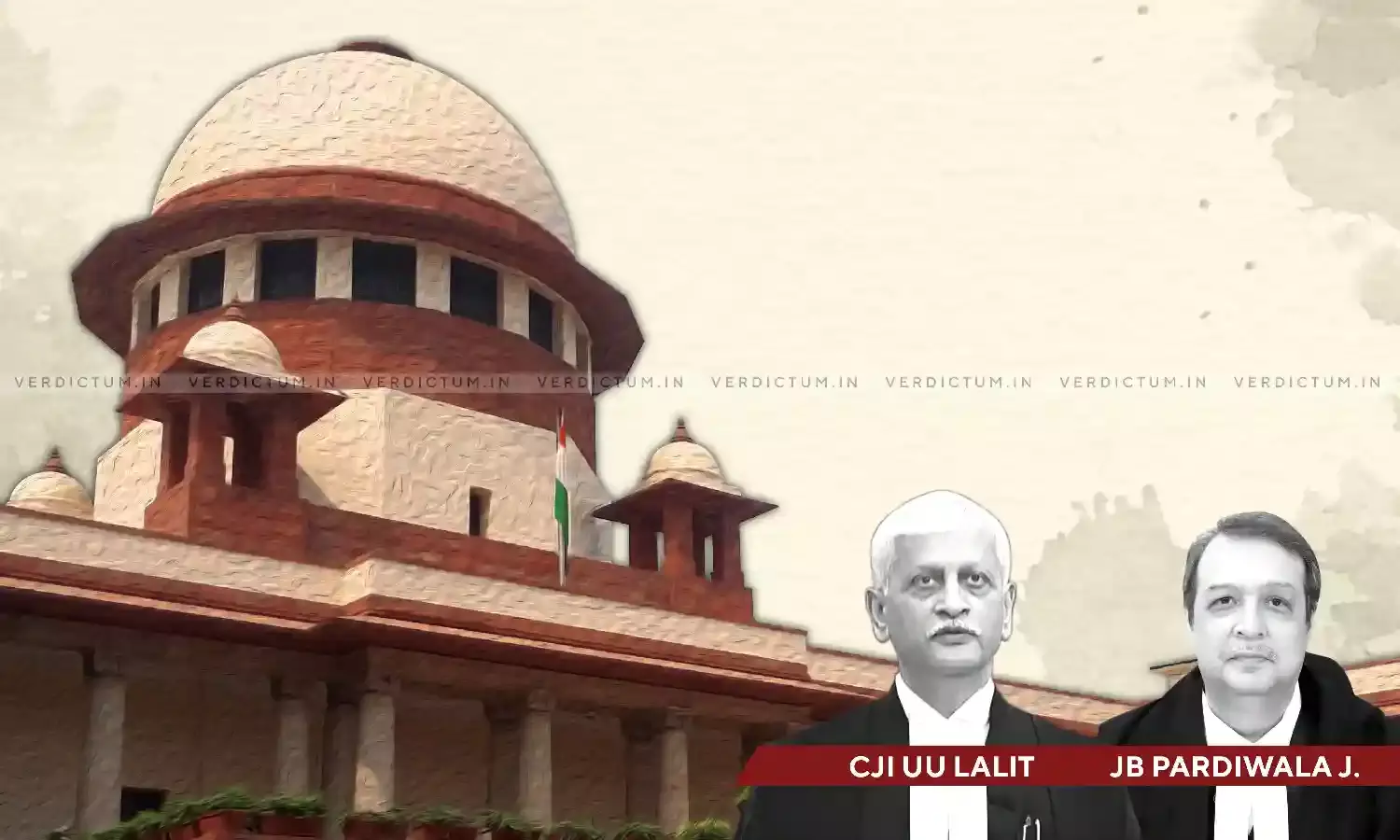Conduct Of An Accused By Itself Cannot Be A Ground To Convict Him For A Serious Offence Like Murder: SC
A Supreme Court Bench of Chief Justice Uday Umesh Lalit and Justice JB Pardiwala acquitted a person who was convicted for murder by setting aside the Judgment passed by Karnataka High Court.
While acquitting the accused, the Court observed that "Although the conduct of an accused may be a relevant fact under Section 8 of the Evidence Act, yet the same, by itself, cannot be a ground to convict him or hold him guilty and that too, for a serious offence like murder."
The Court also observed that "Having gone through the entire impugned judgment passed by the High Court, we do not find any satisfaction recorded therein that the findings of the trial court are palpably wrong, manifestly erroneous or demonstrably unsustainable. In the absence of such satisfaction, the High Court, in our opinion, should not have disturbed a wellreasoned judgment of acquittal, passed by the trial court."
Counsel Krishna Pal Sigh appeared for the Appellant and Counsel VN Raghupathy appeared for the State.
In this case, a statutory criminal appeal was preferred by a convict accused who was charged with the offence of murder.
According to the prosecution, Accused No. 2 and the Appellant had an illicit affair, that was opposed by the mother of Accused No. 2 (the deceased) and consequentially, The Appellant and Accused No. 2 entered the deceased's house and hit her on the head and neck with a hard object. The prosecution further alleged that the Appellant and Accused No. 2 removed the gold ornaments from the deceased's body, along with her mobile phone.
It was further alleged by the prosecution that after the murder, Accused No. 3 helped dispose the dead body by burying it in a pit. As per the prosecution's case, the Appellant then sold the gold ornaments to a jeweller, and also sold the mobile phone.
The son of Accused No. 2 then informed the son-in-law of the deceased that the deceased had been missing, and resultantly, a missing complaint for filed.
Thereafter, Accused No. 3 made an extra judicial confession to the son-in-law of the deceased and told him about the murder. The son-in-law then filed an FIR for murder.
Upon appreciation of oral and documentary evidence, the Trial Court concluded that the prosecution had failed to prove its case beyond reasonable doubt, and it acquitted the Appellant and the other accused.
The State challenged the same before the High Court, and the High Court confirmed the acquittal of Accused No. 2. However, it convicted the Appellant for the offence of murder punishable under Section 302 of the IPC and was sentenced to undergo life imprisonment with fine of Rs. 25,000/. Appellant was also convicted for the offence punishable under Section 201 read with Section 34 of the IPC and was sentenced to undergo simple imprisonment for five years with fine of Rs. 5,000/. Accused No. 3 was convicted for the offence punishable under Section 201 read with Section 34 of the IPC and was sentenced to undergo simple imprisonment for a period of three years with fine of Rs. 5,000/.
Accused No. 3 accepted the conviction and underwent the sentence.
The Appellant approached the Supreme Court.
The Supreme Court observed that the findings of the Trial Court were not palpably wrong, manifestly erroneous or demonstrably unsustainable, and therefore, the High Court should not have disturbed the well-reasoned judgment of acquittal.
The Court also noticed that the investigating officer did not follow the due procedure prescribed by Section 27 of the Indian Evidence Act, and in that context, it was said that "If we read the entire oral evidence of the investigating officer then it is clear that the same is deficient in all the aforesaid relevant aspects of the matter."
The Court observed that the presence of motive only created a strong suspicion against the Appellant, but it was not a substitute for proof of guilt beyond reasonable doubt.
In the same vein, the Court further observed that the circumstances relating to the making of an extra judicial confession and the discovery of the weapon of offence were not established, and held that "the chain of circumstantial evidence snaps so badly that to consider any other circumstance, even like motive, would not be necessary.
In light of the reasons mentioned above, the Supreme Court concluded that the High Court had committed an error in holding the Appellant guilty of the offence of murder.
Accordingly, the Court set aside the order of conviction.
Cause Title: Subramanya v. State of Karnataka
Click here to read/download the Judgment




